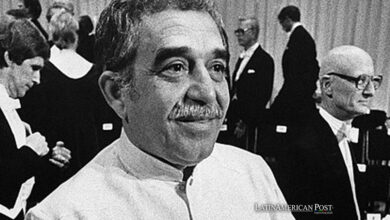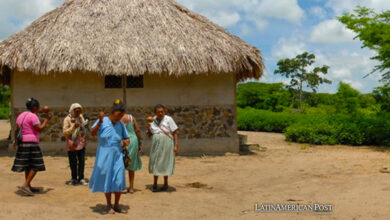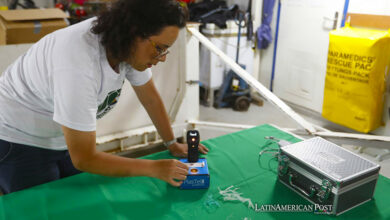Three Latin American politicians with COVID and other news of the week
These were the main news of the week in the American continent .

These are the most relevant political news of this week. / Photos: twitter.com/JeanineAnez, White House by Shealah Craighead
LatinAmerican Post | Juliana Suárez
Listen to this article
Leer en español: Tres políticos latinoamericanos con COVID y otras noticias de la semana
Jeanine Áñez and Diosdado with COVID
After starting the week with the news that President Jair Bolsonaro has coronavirus, last Thursday two other leaders made the same announcement.
On the one hand, the interim president of Bolivia, Jeanine Áñez announced that a Coronavirus test was performed and the result was positive. She made the announcement through a video on her Twitter account and said she feels good and strong and that he will continue to work virtually in compliance with a 14-day isolation. Áñez underwent the test after some members of her team tested positive and will be tested once the 14 days are over.
He dado positivo a Covid19, estoy bien, trabajaré desde mi aislamiento. Juntos, vamos a salir adelante. pic.twitter.com/oA4YVYlZFa
— Jeanine Añez Chavez (@JeanineAnez) July 9, 2020
For his part, Diosdado Cabello, the political leader of the Chavista regime in Venezuela and President of the ruling National Constituent Assembly, also announced that he tested positive for Coronavirus. The leader already claimed to be in medical treatment and isolated.
Queridos compañeros y compañeras cumplo con informar q luego de realizarme las pruebas correspondientes he resultado positivo en Covid 19, desde ya me encuentro aislado cumpliendo el tratamiento indicado, gracias por sus buenos deseos, con la moral en alto. Nosotros Venceremos!!
— Diosdado Cabello R (@dcabellor) July 9, 2020
The AMLO – Trump meeting
July 8 was the first meeting between the President of Mexico, Andrés Manuel López Obrador, and Donald Trump, in Washington. This became the first trip of the Mexican president and the reason was the signing of the T-MEC, the free trade agreement between the two nations and Canada. Although the latter is also part of the treaty, Justin Trudeau did not travel to the United States for the meeting.
Despite the turbulent relations that these two countries have had, especially in the last presidential term, the two holding opposite ideologies, both praised their namesake and thanked them for the collaboration that began with the signing of the new treaty.
Declaración Conjunta con Donald Trump, presidente de EE. UU., desde Washington. https://t.co/Z5Fj1CBqbS
— Andrés Manuel (@lopezobrador_) July 8, 2020
In the past, AMLO had been a harsh critic of the American president, criticizing the expansion of the border wall and Trump's immigration policy. However, on this occasion, López Obrador told him in the middle of the meeting: "You have not treated us as a colony, on the contrary you have honored our condition as an independent nation. Therefore, I am here. To express to the people of the United States. that its president has behaved towards us with kindness and respect. " Similarly, Trump referred to Mexicans as "working people, they are incredible people, they are a large percentage of business owners. They are very successful."
Also read: 400 million jobs affected by COVID and other news of the week
While dozens of Mexican migrants gathered outside the White House to receive and praise AMLO, still others criticized the president for a visit abroad at a critical moment in the pandemic. So far, Mexico has more than 280,000 infections and the numbers are between 5,000 and 6,000 infections daily. The criticism also revolves around the fact that both presidents have shown a negative attitude towards COVID, so much so that neither of them used masks in the meetings, despite the fact that their companions did.
New reform in Peru
The Peruvian Congress approved a constitutional reform that eliminates immunity for the president, ministers, and parliamentarians. The new reform includes that these political figures can be judged. For example, in the case of the president or other members of the administrative branch, they could be tried for crimes related to public administration.
This approval was given just after the president, Martín Vizcarra, announced a referendum on this issue for 2021. The announcement of the referendum was given by the government after Congress had not approved it as it did not reach the threshold because it was constitutional reform. For this reason, Vizcarra had regretted the decision of Congress and called on the Peruvian people to decide.
“Ningún constitucionalista del país estaba de acuerdo con la eliminación de la inmunidad parlamentaria, pero sabíamos que era una necesidad para la confianza de nuestra ciudadanía y hemos hecho este esfuerzo”.
@LuisValdezF, primer vicepresidente del Congreso. pic.twitter.com/jWjNKx1Abr— Congreso del Perú (@congresoperu) July 6, 2020
The intention to eliminate parliamentary immunity is one more move against corruption, a flag that Vizcarra has carried in his presidency, in a country where several presidents and top officials, including former President Pedro Pablo Kuczynski, are peppered with corruption scandals like Odebrecht. However, voting for this reform was also a challenge since it implies changing the Constitution, which is why some members of Congress abstained at first.
USA says goodbye to WHO
President Trump initiated a series of threats against the World Health Organization by criticizing it for its handling of the start of the pandemic. According to what the US president said, the WHO and China had concealed the emergence of the virus, which worsened the situation.
At the time he announced that he would temporarily curb US financial support for the organization and later proceed to withdraw from it. Finally, the Donald Trump government followed through on its threats and withdrew its country from the WHO, presenting a letter to the United Nations secretary-general, Antonio Guterres.
Since May, Trump had started this process but the letter presented a few days ago is the official statement. The process to withdraw will take effect on July 6, 2021, one year after they filed the notice.
A US sector applauds Trump's decision, as they have sometimes said that the WHO was biased and worked in favor of China. On the other hand, detractors have criticized the decision.
Congress received notification that POTUS officially withdrew the U.S. from the @WHO in the midst of a pandemic.
To call Trump’s response to COVID chaotic & incoherent doesn't do it justice. This won't protect American lives or interests—it leaves Americans sick & America alone.
— Senator Bob Menendez (@SenatorMenendez) July 7, 2020
Colombian Sergeant dismissed
Several days ago, Colombia and the whole world were shocked by the sexual abuse by members of the army towards an Embera indigenous girl, which sparked a whole wave of complaints related to more cases of indigenous minors from different areas of the country.
This week, it was announced that Sergeant Juan Carlos Díaz, who denounced the 8 members of the army who raped the minor, was removed from office. The news was highly criticized by Colombians, as many allege that the army is a damaged institution.
However, against this General Eduardo Zapateiro spoke at a press conference together with Defense Minister Carlos Holmes Trujillo. During the statements, the general stated that the reason for removing Díaz from office had to do with his indirect responsibility in the case. Despite having reported the facts to the competent authorities in time, his role as sergeant in charge of that battalion implied responsibility for maintaining control of all his soldiers.
That is, although Díaz was not a participant in the violent act, he was in charge of those responsible. Zapateiro said that "command and control means that, because of their position, commanders must be at the forefront of the normal operational procedures that a unit executes … they must always control and lead the men under their command".




